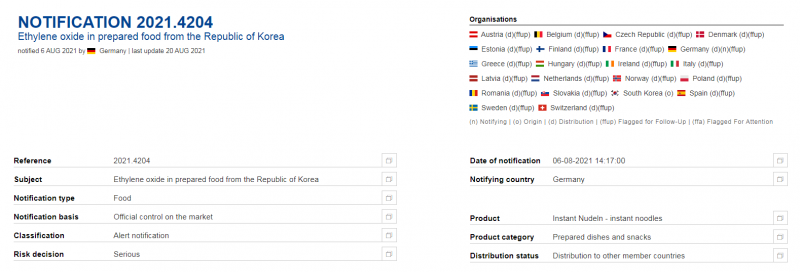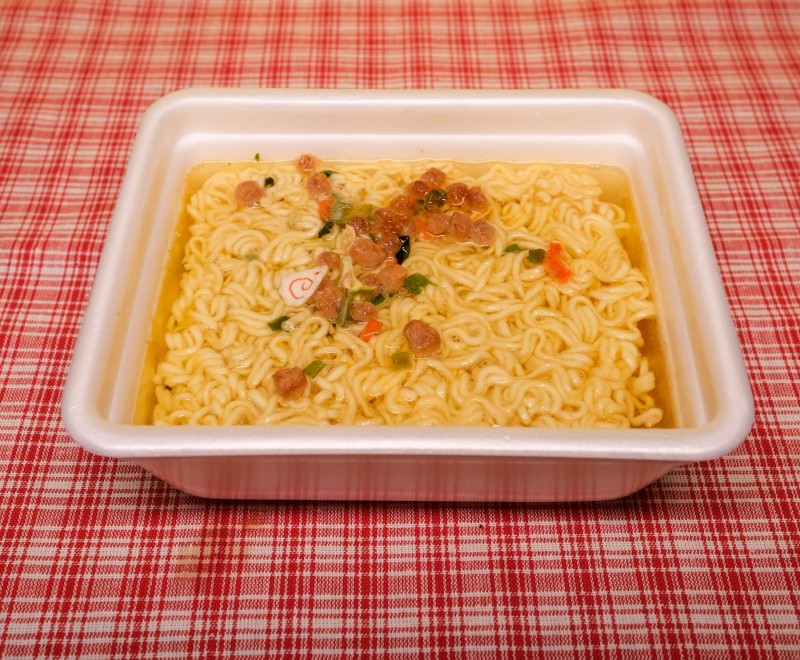Recently, there have been overwhelming reports about the detection of ethylene oxide carcinogens in Korean instant noodles, and it was once popularly searched on major news media websites. Korean consumers are concerned about the safety of instant noodles. The Ministry of Food and Drug Safety(MFDS) has conducted an on-site investigation of the company involved and released the findings on August 17. It has been confirmed that the manufacturer did not use ethylene oxide in the production process,but 2-Chloroethanol was detected in some products. Foodmate has collected and sorted out the progress of the incident and the relevant information on the supervision of ethylene oxide and 2-chloroethanol in various countries for your reference. This time, let’s review the incident and the reason for the notification.
A. Event review
Recently, the EU RASFF system notified South Korea that 2-Chloroethanol was detected in instant noodles exported to Europe. On August 13, considering that instant noodles are high-consumption foods, MFDS immediately conducted an on-site investigation of the company involved and recalled related products after receiving the notification information.
On August 17, Korean MFDS released the test results of 2-chloroethanol in instant noodles. The results showed that no ethylene oxide was detected in the product. The detection amount of 2-chloroethanol in the dried shallots of NONGSHIM's export seafood Ramyun’s vegetable package was 0.11㎎/㎏, and the detection amount of vegetable package of domestic products was 2.2㎎/㎏.The detected amount of 2-chloroethanol in the RABOKKI NOODLE’s powder packet exported by PALDO is 12.1㎎/㎏, but the detected amount will not cause harm to the human body.
Because 2-chloroethanol may be unintentionally contaminated or produced, MFDS has established a temporary limit standard for 2-chloroethanol for safe management, that is, agricultural, livestock and aquatic products and their processed products are less than 30㎎/㎏, Infant food is 10㎎/㎏ or less.
B. Analysis of the cause of notification
The actually detected substance in instant noodles notified by the European Union is 2-chloroethanol, which is a metabolite of ethylene oxide. According to EU regulations, the sum of ethylene oxide and 2-chloroethanol is calculated as ethylene oxide. Therefore, the European Union notified that ethylene oxide was detected in Korean instant noodles. The International Agency for Research on Cancer of the World Health Organization has classified ethylene oxide as a first-class carcinogen that is harmful to humans. Let’s take a look at ethylene oxide and 2-chloroethanol together.
(1) What is ethylene oxide?
Ethylene oxide is an organic compound with a chemical formula of C2H4O. In some countries, ethylene oxide is used as a fumigant and disinfectant for agricultural products, and it is widely used for disinfection of hospital equipment and medical supplies. In addition, ethylene oxide is also used as a raw material for the production of various compounds such as ethylene glycol, glycol ethers and surfactants.
(2) What is the relationship between ethylene oxide and 2-chloroethanol?
Ethylene oxide is used to sterilize products such as spices and cereal flours in some countries. Ethylene oxide reacts with chlorine to produce 2-chloroethanol. 2-chloroethanol is a reaction product of ethylene oxide, an intermediate and by-product of ethylene oxide, but it also exists in the environment, can be produced through various chemical reactions, and is not carcinogenic.
Above, we briefly introduced the detection of carcinogenic ethylene oxide metabolites in Korean instant noodles and the reason for notification. Next time we will introduce the supervision of ethylene oxide and 2-chloroethanol in various countries. How to deal with it? Stay tuned.



